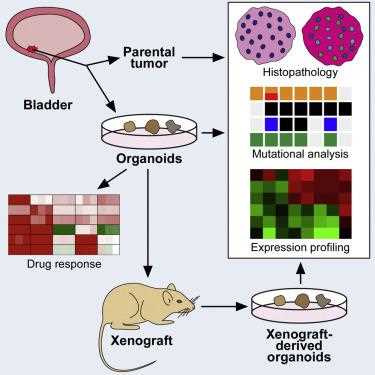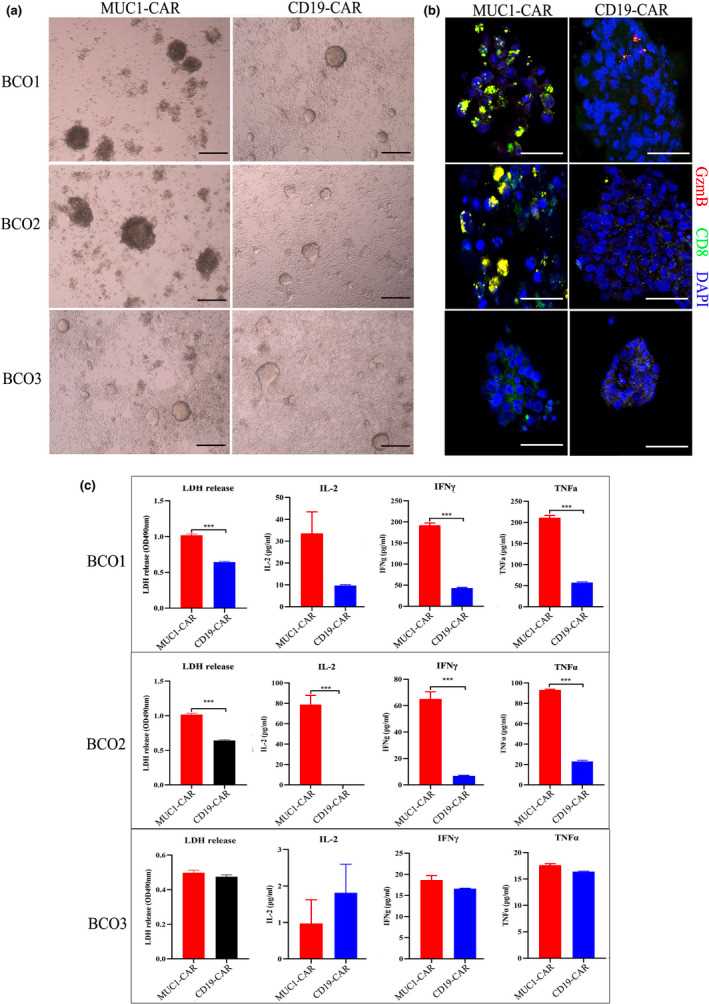All products and services are For Research Use Only and CANNOT be used in the treatment or diagnosis of disease.
Cancer organoid is a prevailing in vitro model to study the mechanism of tumorigenesis and serves as a clinically related, easy-to-use tool to test the sensitivity of drugs and immunotherapeutics for cancer treatment. Creative Biolabs has developed a cancer organoid platform, including various cancers, to evaluate CAR‐T cells mediated killing against solid tumors. The patient-derived bladder cancer organoids resemble the heterogeneity and biological characteristics of tumor tissue of origin and can be used to predict CAR-T therapeutic responses in vivo.
 Fig.1 Establishing well-characterized bladder cancer organoids for potent therapy development. (Lee, et al., 2018)
Fig.1 Establishing well-characterized bladder cancer organoids for potent therapy development. (Lee, et al., 2018)
Multiple subtypes of bladder cancer organoids consist of a high throughput platform for CAR-T efficacy tests.
Types of bladder cancer and derived organoids
| Type | Organoids Subtypes | Organoid Identification | |
|
Luminal |
Luminal markers CK20 Uroplakin II GATA3 |
|
|
Basal |
Basal markers CK5 P63 CD44 |
|
All bladder cancer-related protein antigens are tested to determine the antigen profile of established organoids using specific antibodies.
| Techniques | |||||
| Immunohistochemistry | Fluorescence Microscopy | ||||
| Potential Targets | |||||
| B7‐H3 | vEGFR2 | CEACAM5 | HER2 | FRα | GD2 |
| PSCA | MSLN | PD‐L1 | CD44v6 | PSMA | EGFRvIII |
Bladder cancer organoids and CAR-T cells cooperate in the co-culture system to test the response of BCOs to immunotherapies in vitro. Specific killing of CAR-T is assessed using cytotoxic assays and ELISA test of cytokine secretion.
 Fig.2 Workflow of the co-culture system for CAR-T efficacy tests. (Creative Biolabs)
Fig.2 Workflow of the co-culture system for CAR-T efficacy tests. (Creative Biolabs)
Creative Biolabs possess a wide range of CAR-T products and kits for bladder cancer study, including CAR vectors, viral particle packaging kits, CAR cells, and so on. Our products have been validated with high performance by global clients.
| Target Antigen | Target Description | CAR-T Products |
| MUC1 | The expression of MUC1 is elevated in urothelial carcinoma, especially in metastatic carcinoma. | Anti-MUC1 CAR-T |
| c-FOS | Carcinogenesis of bladder cancer can be suppressed by targeting c-FOS. | Anti-c-FOS CAR-T |
| PSCA | Prostate stem cell antigen (PSCA) is a cell surface protein and has an overexpression on various tumors, such as bladder, prostate, gastric cancers, and pancreatic cancers. | Anti-PSCA CAR-T |
| Utilizing Bladder Cancer Organoids as a Model to Evaluate CAR-T Cell Function | |
| Organoids |
Source: cystectomy specimens from patient Organoid name: invasive bladder cancer organoids Identified target antigen: MUC1 |
| CAR-T cells |
Cell name: second generation MUC1 CAR‐T cells Control cells: CD19 CAR‐T cells |
| Results of efficacy test |
|
 Fig.3 Specific cytotoxicity of CAR-T cell in bladder cancer organoids. (Yu, et al., 2021) |
|
Creative Biolabs has extensive experience in organoids and CAR-T research. If you are interested in our products or services, please do not hesitate to contact us.
References
For any technical issues or product/service related questions, please leave your information below. Our team will contact you soon.
 NEWSLETTER
NEWSLETTER
The latest newsletter to introduce the latest breaking information, our site updates, field and other scientific news, important events, and insights from industry leaders
LEARN MORE NEWSLETTER NEW SOLUTION
NEW SOLUTION
CellRapeutics™ In Vivo Cell Engineering: One-stop in vivo T/B/NK cell and macrophage engineering services covering vectors construction to function verification.
LEARN MORE SOLUTION NOVEL TECHNOLOGY
NOVEL TECHNOLOGY
Silence™ CAR-T Cell: A novel platform to enhance CAR-T cell immunotherapy by combining RNAi technology to suppress genes that may impede CAR functionality.
LEARN MORE NOVEL TECHNOLOGY NEW SOLUTION
NEW SOLUTION
Canine CAR-T Therapy Development: From early target discovery, CAR design and construction, cell culture, and transfection, to in vitro and in vivo function validation.
LEARN MORE SOLUTION